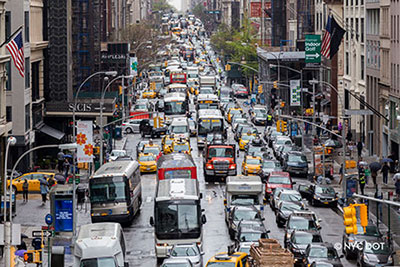By: Hadassa Kalatizadeh
Just as New York City businesses try to lure their employees back into their offices, traffic peaks.
Traffic in the Big Apple is returning to pre-pandemic levels, having been named the worst gridlock in the nation. The Texas Transportation Institute recently revealed that New York surpassed Los Angeles as the country’s worst gridlock major metropolitan area last year. In the meantime, hourly data from StreetLight, shows traffic now is almost at pre-COVID levels. This is despite the fact that many people are still working from home. “Right now, people who have to show up for work, they’re driving more than ever before,” Matt Carmody of the transportation firm AKRF told The Post. Midday traffic in the early afternoon, is worse than it was even before COVID, he said. “It’s become ‘rush afternoon.’ It starts earlier and it’s worse than ever,” added Carmody. “People are really going to have to get back on trains and buses, or it’s going to become much worse than it is now.”
This is sparking new calls for congestion pricing. In 2019, congestion fees were already approved by the state but never went into effect, being stalled in the White House for 20 months. Many advocates feel that implementing the program can improve gridlock by discouraging commuters from driving into the city, and leading the way for New Yorkers to get back onto subways and buses.
City leaders have been calling for tolls on Manhattan car trips below 60th Street. This month, Mayor Bill de Blasio pushed for congestion fees to be launch by July 2022. Similarly, mayoral frontrunner, Eric Adams tweeted his support for tolls. “We need congestion pricing $ ASAP to protect stations from street flooding, elevate entrances and add green infrastructure to absorb flash storm runoff,” tweeted Adams, alluding also to the roughly $15 billion that the congestion fees will raise for mass transit improvements. “Even without tourism, congestion is back — and it’s going to be far worse in September,” said Partnership for NYC President Kathryn Wylde. “The pandemic has made clear that commute time matters more than ever to people. People have far less patience with time wasted in their commute than ever now that they’ve gotten used to remote work.”
The MTA has yet to reveal a new timeline for the implementation of congestion fees. The agency says it will be implemented— but first a federally-mandated environmental assessment must be conducted. “The Federal Highway Administration is requiring us to conduct an Environmental Assessment with robust public outreach, something we agree is necessary,” said MTA spokesman Ken Lovett.





